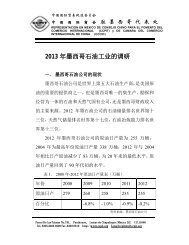F REIGN TRADE - 中国国际贸易促进委员会
F REIGN TRADE - 中国国际贸易促进委员会
F REIGN TRADE - 中国国际贸易促进委员会
Create successful ePaper yourself
Turn your PDF publications into a flip-book with our unique Google optimized e-Paper software.
in China offer a fixed sum rather thanthe coupling of commercial insurancewith caring services and do not eliminatethe risk of potential price increasesin LTC services.“China’s ability to deal with thesechallenges will have a significant impacton its prosperity level for decadesto come,” said Richard Huang, a BCGpartner based in Beijing. What is more,failure to address the difficulties couldhave dramatic consequences such as anonerous public-deficit burden, a delayedretirement age, and a reduction in retireebenefits. The worst-case scenariowould be a full-scale rupture of thecountry’s social security net.The scope of this problem shouldnot be underestimated. Finding solutionswill require a concerted effortamong the public and private spheres.Indeed, the Chinese government willneed to drive meaningful reforms ofthe social security system and corporationswill have to take more initiativein providing post-retirement services.Consumers, for their part, will needto adopt a longer-term view on savingsand investments.“It takes the efforts of all stakeholders— the Chinese government,corporations, and insurers — to meetthe challenges posed by China’s agingpopulation,” Jia Jingwei, Head of ChinaBusiness Development of Swiss Re.“Insurance companies, in particular,will need to play a larger role.”Implications for insurersChina’s social security system isunlikely to be able to cope with thechallenges of an aging population.Therefore, the report suggested the followingsolutions.Proactively Lobby for Reformand Educate Consumers. The role ofcommercial insurance must be expandedthrough the development of voluntaryemployer and personal pensionsystems (Pillars II and III) in order toaddress the shortfalls of the mandatorysystem.The same principle applies to commercialhealthcare and long-term careinsurance (to complement the nationalhealthcare system).Regulatory reform must be undertakento create a more robust pensionand health care system. Insurers shouldproactively drive and support reforms,particularly changes that could be catalystsfor the development of voluntarypension systems. Such reforms couldinclude tax incentives, the portability ofpensions, and the construction of a risktrading platform for insurers, reinsurers,and other investors.The importance of fiscal incentivesin prompting corporations and individualsto join voluntary, complementaryinsurance schemes is widely recognized.Indeed, Germany provides a goodexample of the impact that fiscal incentivescan have. Since the beginningof 2002, Germany has carried out aseries of pension reforms known as theRiester plan to foster the developmentof private personal pensions (equivalentto China’s Pillar III).Under this plan, private retirementsavings are promoted both bystate subsidies and by tax-deductionsfor contributions and purchases of bankand insurance investment products.As a result of this plan, the Germancommercial pension market has growntremendously — from around four millionpension contracts in 2002 to over14 million in 2011.At the individual level, the mostcritical necessary change in China isthe adoption of a longer-term view onsavings and investments. Currently,Chinese people tend to focus moreon short-term profit opportunities,neglecting investing in their post-retirementincome, health care, and longtermcare needs. Insurers can play a keyrole in educating individuals about theincreasing challenges that they will faceto sustain their standard of living andhow they can successfully clear thesehurdles through personalized financialplanning and investment/savings offerings.The good news is that China’ssavings rates, standing at an averageof around 50 percent of GDP, are veryhigh, representing huge opportunitiesfor insurers that can successfully channelthese savings into the right investmentand insurance products.Cooperate with the Social SecuritySystem. Besides lobbying the governmentfor reforms, insurers shouldalso collaborate with the social securitysystem to help the government manageits pension and healthcare systems atlower levels of risk and cost.China’s national pension funds, aswell as corporate pension schemes, areexposed to different degrees of longevityrisk. By Swiss Re’s estimation, anadditional mortality improvement of1 percent per annum would increase apensioner’s liabilities by roughly 5 percentto 6 percent. Insurers, reinsurancecompanies, and capital markets canplay a significant role in helping transferpart or all of the longevity risks ofChina’s national pension system.“Joint risk management” betweeninsurers and the government canstrongly support the development ofhealthcare system in China. Some local50

















